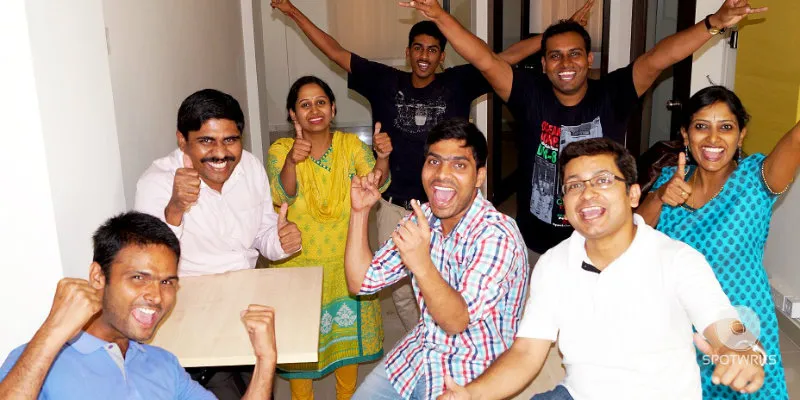How carpooling platform QuickRide plans to decongest Bengaluru traffic
According to a survey conducted a while ago, Bengaluru ranked as the sixth worst city in the world for commuting. Years later, the condition in the city still hasn’t improved.

Rapid increase in vehicles in Bengaluru has caused an enormous parking crunch. Multi-level car parking construction in major IT parks, malls and other places haven’t addressed the parking issues of the city. Haphazardly-parked vehicles protruding onto the roads are a common sight that in turn leads to traffic issues. The situation in residential areas isn't any better either. A recent study stated that 90 per cent of Bengaluru households do not have parking space and are forced to park their vehicles on the road or on footpaths.
KNM Rao has had a firsthand experience of Bengaluru’s traffic. After he quit his role as Director of Middleware Platform Development at Huawei Technologies, he wanted to address the city’s traffic issues. And the answer was carpooling. He, however, was aware of the fact that despite many apps in India and across the globe facilitate ride-sharing, they could not make much impact in India and eventually died.
Undeterred by failures faced by others, Rao decided to develop an app for real-time ride sharing with end-to-end automation, starting from registration, finding and coordinating with a ride partner, transaction and rating. Thus, QuickRide came to be.
Launched in September 2015 by Rao, Subhro B. Chakraborty and Shobhana BN, Quick Ride is a bike/carpooling ride platform that connects commuters travelling in the same direction in real-time and schedules the rides instantly for an immediate ride, or even in advance for upcoming rides. It provides real-time location and status of ride participants on live map.
“Our ultimate dictum was maximum usage of available resources and filling those empty seats on the road. We always considered cars with single occupants a sheer wastage of resources that gives rise to many unpardonable issues like traffic jams, cluttered parking spaces, pollution, and long hours on the road which impacts one’s health,” says Rao, 41. He has had 16 years of prior experience in product development companies such as Philips, Cisco and Huawei.
Revenue model and growth
The platform enables riders to choose their cost sharing with default recommended fare of Rs 3 per km (customisable in the range of Rs 0 to 8 per km). It collects five per cent of every transaction as a service fee to cover technology development, cloud infrastructure and payment gateway charges. Transactions are cashless, through the app. If a rider offers a free ride as a green initiative or purely for sharing purpose, Quick Ride gets zero from the transaction.
In the last four months, the platform has had 4,400 users registered and clocked an average of 130 rides per day. The startup claims it has confirmed sources of funds sufficient to operate for the next six to 12 months, considering current burn-rate and expansion plans.
Market and competition
There are nearly 70 million vehicles in India. According to a PricewaterhouseCoopers report, the global carpooling market is estimated at $15 billion today, a figure that is projected to hit $335 billion by 2025.
On the market opportunity, Rao says that he’s eyeing an opportunity that roughly equals the net growth rate of number of private vehicles on roads on an annual basis.
MeBuddie, PoolCircle, Orahi and CarPoolAdda are some of the players in the carpooling business. Brazilian Tripda and French BlaBlaCar are the giants in the segment.
Last year, BlaBlaCar raised $200 million in Series D led by from Insight Venture Partners and Lead Edge Capital, to explore emerging markets, including India, Brazil and Turkey. This month, Gurgaon-based Orahi raised Rs 3.5 crore from Indian Angel Network.
On competition, Rao says his main differentiator is technology and user experience. He claims that Quickride’s technology solution will outstrip the competition.
The platform has various measures for customer acquisition. “B2B partnerships are the main channel of acquiring customers. We are in the process of discussions with enterprises - some large employers. Large residential apartment complexes are also a source of user growth. Road shows and events are another effective channel. We are also the preferred carpooling partner for some prominent tech parks in Bengaluru,” says Rao.
Growth prospect
In the next six months, the platform is targeting 5,000 ride shares every day, across India. It aims to reach at least one lakh registered users by second half of 2016. It is also rolling out operations in three more major cities before the end of the year.
“Our team is all set to take the app to each corporate, urging them to roll out the economic and environmental benefits to their employees and drive the initiative for green cause,” adds Rao.
YourStory take
Taxi aggregators, carpooling platforms and self-drive car companies are working hard to create an alternative for owning a personal car. Besides, government policies like odd-even rule in Delhi has also worked to enforce the idea of using other modes for commuting, like carpooling. And such initiatives of the government have helped auto startups promote their products and ideas.
Quick Ride's initiative is commensurate with the current condition of traffic and deteriorating environment. From the business viewpoint, the market is still in infancy to fully adopt the idea of not owning a personal car. However, if car service providers, including taxi aggregators, carpooling platforms and self-drive car companies, can create a robust market offering a complete alternative, it would be a big win-win situation for all – environment, traffic and business.







